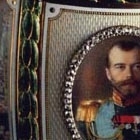GENERAL ALEXEIEFF - Chief of the General Staff
When I first met Alexeieff he was Chief of the Staff to General Ivanoff, in 1914.
He had served on first joining the army in an infantry regiment, his first campaign having been in 1877-1878, after which he passed successfully through the Military Academy, serving later during the Manchurian war as Q.M.G. and then Chief of the Staff to one of the armies.
He had all the appearance of a professor, with the keenness and alertness of a soldier, an excessively quiet and courteous manner, being rarely perturbed or dismayed, and if he was - failing to show it. A real glutton for work, which, to be critical, led to his overcentralising, insisting on seeing personally every telegram that arrived, whatever the hour of day or night, and thus putting such a strain upon himself that the inevitable breakdown finally caused him to take sick leave shortly before the Revolution.
On the appointment of the Emperor as Commander-in-Chief in the field, Alexeieff was made Chief of the Imperial General Staff.
He had received great credit for the early success of the 1914 operations in Galicia when serving under Ivanoff, and confirmed the high opinion held of him when in 1915 he commanded the armies on the N.W. front. To him, indeed, it was due that the Germans got no farther than they did at a time when the Russian armies were so badly crippled by want of munitions and guns.
I have already referred to the high opinion in which he was held by the Grand Duke Nicholas, an opinion which extended pretty well throughout the armies.
His responsibilities, as may easily be imagined, were pretty heavy, the direction of affairs being left so much in his hands that he was Commander-in-Chief in all but name. Failure on his part would react against his Sovereign, and the moment at which he took over the post from Yanuskevich, who had acted up till that time in the same position with the Grand Duke Nicholas, was one of grave danger for Russia, with the enemy almost thundering at the gates of Petrograd.
With all these weighty anxieties on his hands, and constant visits from ministers and other officials, including the naval operations which came indirectly to him, the C.-in-C. being C.-in-C. by sea as well as by land, it was but little wonder that we chiefs of Allied missions found it difficult to reach him when we wanted an interview. We were a large and mixed body, and his fixed determination to let no one answer for him prevented one from opportunities of talking over matters as often as one would have wished.
Probably other Chiefs of General Staffs felt the same about a crowd of Allies hungry for news, and possibly acted in the same way, but when one did accomplish it, I always found him, even at the late hour of the night which was generally chosen for the interview, clear, most friendly and anxious to fall in as far as lay in his power with other views which had to be laid before him.
He was very quiet in manner, spoke low and slowly, and kept as far away as possible from the luncheon and dinner crowd which surrounded the Emperor, preferring a shorter and quieter meal both morning and evening with the Staff Officers' Mess.
It was but rarely that he could get away on a visit to the armies, and until his health failed and his wife joined him he practically lived and slept at his office.
No wonder the strain eventually broke him down for a short period, which he personally would very likely have shortened had it not been for his full confidence in General Gourko and General Klembovsky, who acted for the latter during the interAllied conference in 1917.
On his return to Headquarters I went down to the station to meet the man for whom we all had so much respect, and found him looking so much better that one felt cheered by the prospects for the future, but alas! he was hardly back before the trouble ending in revolution began.
There have been various opinions expressed as to his attitude then. It has been said that he should have acted in time to stop it, that he did not show loyalty to the Emperor by remaining on to serve the new Government.
Such opinions are unjust and unfair to a man who unfortunately is no longer able to speak for himself.
My own view of Alexeieff's action at this time is that he did the best to warn his Emperor of the dangers around the throne, but that, unfortunately, other views overmastered his.
Nothing will alter the opinion I hold that he was loyal to the Emperor throughout, intensely loyal to the Allied cause and to his country. It was, I believe, the Emperor's personal wish that he remained at his post, and continued to do so later as C.-in-C. when the 'no Romanoff' order came into effect.
The continuation of the war till the defeat of the enemy was his wish, his anxiety and, so far as lay in his hands, his determination.
But he found that the master he had to serve later on, Kerenski, imbued no doubt with a desire for victory, but imbued, unfortunately, with an absolutely ignorant idea as to the necessity of stern discipline as a factor to that end, held views with which Alexeieff found himself totally unable to work.
Later on when the opportunity arose to render further service to his country, then suffering in the toils of that Bolshevism which broke the hearts of so many of our loyal Russian Allies, he again took the field.
What had he to gain? People have said that he was not sufficiently loyal to the Emperor. That I do not believe. He fought to the end, ashamed no doubt that the Russia he loved should give cause for the idea that she had failed her Allies, and to us as well as to his own land I assert that he was loyal to the end.
I only wish that he were still alive to say so himself.
Comments on this site should to: Bob Atchison

